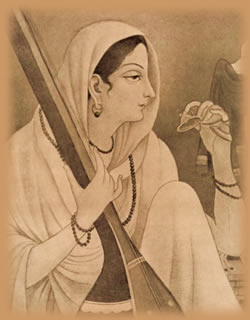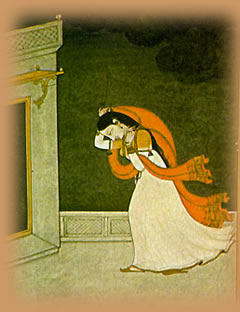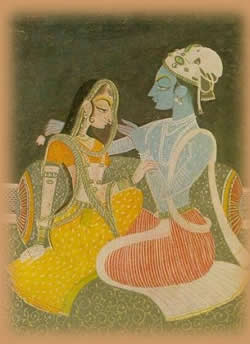
I
am a powerless madwoman,
Krishna’s arrow has pierced my heart,
taking away my reason
Mira Bai
Raised in a Rajasthan court by her grandparents, Mira Bai (1498-1547 CE) would become one of the most famous of India’s bhakti poets. Legend tells that she was given a statue of Krishna as a child, and at the age of 18, when she was married to the prince of Mewar, she took this treasured talisman with her, offending her in-laws when she refused to worship their own preferred deity, the goddess Kali.
The facts—even the dates—of her life are disputed, but tradition says that after her husband’s death, she spent her time singing her own compositions and receiving wandering mendicants. This was seen as a violation of class and propriety, and for that, she was persecuted. Eventually she left the court, taking up the wandering life and seeking out places associated with Krishna.

Seeking shelter from the storm
I
do not care about social norms
Nor do I keep my family’s honour.
I cannot forget, even for a moment,
The beauty of my lover...
Mira Bai
When you ask Google* to define the word ‘introverted’, one definition that it finds on the web is: “a person who tends to shrink from social contacts and to become preoccupied with their own thoughts.” In contrast I found this much more to my liking: “[an introvert is one] directed more toward inward reflection and understanding than toward people and things outside of self.”
Being introverted myself, I have often run up against the assumption that it is somehow ‘pathological’. And yet any study of religious figures reveals that almost all had an introverted nature. Think of the vast amount of time that Zarathustra, Jesus, Teresa de Avila, Mohammed, Siddhartha Gautama, Hildegard von Bingen and Baha’ullah—to name but a few—spent alone in meditation, or in intimate inner dialogue with their god. To an outsider this may seem to be withdrawal from all that represents life and community, yet to an introvert, this time of separation is absolutely crucial to the processing of all that is, inwardly, clamouring for attention.
*Here is a handy tip for you. If you want to know the meaning of a word, ask Google to “define: x”.

Radha and Krishna
Come
to my pavilion, O my King.
I have spread a bed made of
delicately selected buds and blossoms,
and have arrayed myself in bridal garb
from head to toe...
Mira Bai
The poems of Mira Bai beautifully express this rich inner life. It is said that, as a child, when playing on the ramparts of her grandfather’s fort, Mira noticed a progression in the streets below. She excitedly asked her grandmother, “Who is that man on horseback?” “He is a bridegroom going to claim his wife,” came the reply. “Where is my bridegroom?” Mira demanded. A bit taken aback, her grandmother pointed to a statue of Krishna in a nearby temple—thus sowing the seed of what would become a lifelong devotion.
When judged by more extroverted standards, an introvert’s life might seem bereft of incident. Mira lost her mother at a very young age, and she never bore children or lived the life expected of her by her family and society. Yet her many poems are proof of the productivity and sustaining force of her devotion. Outwardly she may have presented the appearance of a poor wandering mendicant; on the inside she was living the story portrayed in the legend of Krishna and Radha, the rasa lila at the very core of her being and her life.